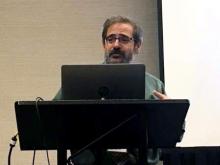SAN FRANCISCO – The patient, a man in his early 50s, smiled as he sang about flatulence. He seemed alert, relaxed, and aware of his wife and the neurologist in the room. Only the length and subject matter of his composition signaled a problem.
Two years later, this same patient was completely nonverbal – a classic case of frontotemporal dementia, said Howard Rosen, MD, a neurologist affiliated with the University of California, San Francisco. He and other experts discussed the disease at the 18th Congress of the International Psychogeriatric Association.
Frontotemporal dementia affects about 15-22 of every 100,000 individuals, and an additional 3-4 will be diagnosed in the next year, according to past studies (Int Rev Psychiatry. 2013 Apr;25[2]:130-7). This and other forms of dementia are often preceded by nondegenerative psychiatric syndromes, such as depression or anxiety, Dr. Rosen noted. “It is often unclear whether patients actually have that psychiatric disorder or symptoms of the disorder that are actually frontotemporal dementia,” he said. “Depression is most common and likely represents a misdiagnosis.”
Frontotemporal dementia also is often misdiagnosed as Alzheimer’s but differs in that about three-quarters of cases begin in midlife. This heightens the need for timely diagnosis and specialized services to support patients and caregivers, who may still have children at home, Dr. Rosen said. Unfortunately, such services are often lacking, he added.
Clinicians who treat patients with frontotemporal dementia encounter several “canonical variants” of the disease, he continued. These include nonfluent and semantic variants of primary progressive aphasia and a third behavioral variant. The nonfluent variant is characterized by frequent grammatical errors (agrammatism), hesitation over individual words, and speech apraxia. In contrast, patients with the semantic variant cannot name common objects, such as a ball or a cup, and only vaguely understand their use. Finally, those with the behavioral variant show “bizarre socioemotional changes,” including disinhibition and antisocial behavior, loss of empathy, “exceedingly poor” judgment, overeating, apathy, and hoarding and other compulsive behaviors, Dr. Rosen said.
Behavioral variant frontotemporal dementia can be especially difficult for family members, other experts said. Jan Oyebode, MD, of the University of Bradford, England, and her colleagues prospectively interviewed seven families and five patients with this form of dementia every 6-9 months to observe how the “lived experience” of the disease changed over time. Family members described struggling to understand emergent and worsening irritability, and lack of empathy in their loved one. “We saw this during the family interviews,” Dr. Oyebode added. “For example, one day a [caregiver with cancer] came back from chemotherapy, and her husband [the patient] turned to her and said something like, ‘you’re late. I’m hungry,’ and did not ask how the chemotherapy had gone. She had tears in her eyes. We had a number of examples like that.”
Another patient with behavioral variant frontotemporal dementia began “going off” on his children, something he had not done before, Dr. Oyebode said. Intellectually, he understood that frontotemporal dementia was causing his behavior, but he struggled to control his rage and could not empathize with his children’s pain, she added. “If you live with behavioral variant frontotemporal dementia, you may be only partially aware of changes in our empathy,” she added. “Because you don’t appreciate the way you have changed, you are puzzled by others’ reactions to you. And because you don’t understand the changes in your own abilities, you tend to attribute them to external factors and blame or avoid others.”
But over time, four of the five patients acknowledged that their families had the most insight into their changing cognition and behavior, and some clearly tried to control their behaviors, Dr. Oyebode said. Nonetheless, it is important to understand that even when patients factually accept their diagnosis, they tend not to “live it from the inside,” she emphasized. “Because you [the patient] feel the same, you may be somewhat bewildered by the changes in your life. But because you do not ‘feel’ the changes, you are able to accept them, even though they are dramatic.”
Such acceptance comes more easily when patients receive calm, direct feedback from family members, she also reported. Family members, too, valued open communication as key to their own process. “For families, there needed to be a [transition] from awareness of the dementia, to empathic understanding, to developing coping processes,” she said. For example, family members learned to help patients plan ahead, step by step, for outings and deconstruct tasks by working them out on a whiteboard, she said.
Studies like this one are important because there is little research on presenile dementia, Dr. Rosen said. “When you’re dealing with young-onset dementia, behavioral variant frontotemporal dementia has to be very prominent in your mind” – particularly because it progresses faster than do the other variants and about twice as fast as does Alzheimer’s disease. It can be easier to understand the symptomatic complexities of frontotemporal dementia by mapping them to specific neuroanatomy, Dr. Rosen added. Imaging is central to diagnosis, and indeed, frontotemporal dementia is the only neurodegenerative disease for which Medicare has approved FDG-PET scans as a diagnostic measure.


